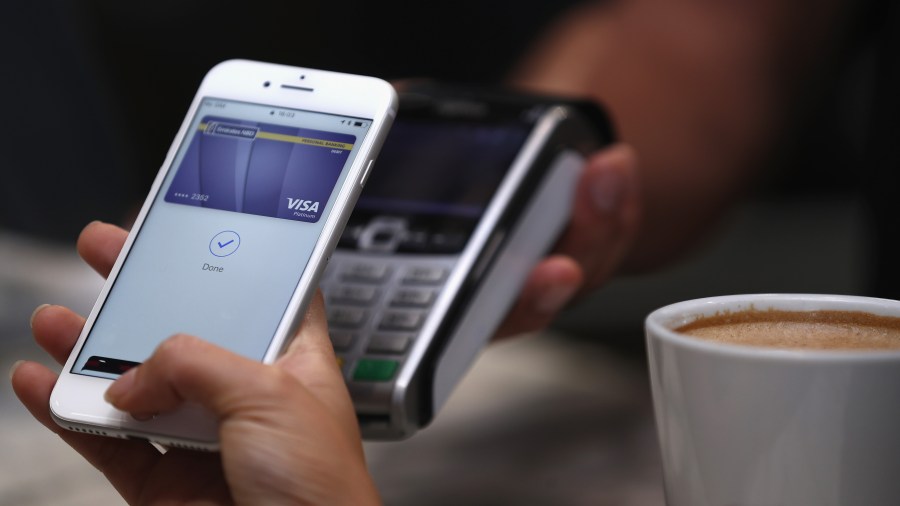The coronavirus outbreak means an opportunity for fintech companies

In New York City — and lots of other places — farmers markets are considered essential businesses. At one in the Fort Greene neighborhood of Brooklyn, people wear face masks and stand 6 feet apart while lining up for bread, potatoes and apples. But while they’re buying the same food as usual, they might have to pay in a totally new way.
In the United States, consumers have been slow to adopt new forms of payment. We like our cash and credit cards, and even things like Apple Pay have been slow to take off. But the COVID-19 crisis is changing how we purchase things. It means that we’re buying a lot more online, even things we’d normally just buy at the drugstore. People can even access federal relief money through Square’s Cash app or PayPal. All of this introduces financial technology apps into places they might not usually be used, like the farmers market.
The one in Brooklyn is traditionally a pretty analog place. In the past, customers were willing to pay with cash, but the coronavirus may survive on the surface of paper money for several hours, at least. That’s discouraged people from using it, but some of the farms don’t take credit cards. So people are turning to their smartphones.
Caroline Shadood works for a duck farm that has a stall at the market. She came up with the idea of having customers pay her through Venmo, and then she pays the farm back in cash.
“Working for the farm for so long, and knowing they’ll never concede to credit cards, and knowing that I have so much cash, I just started doing it a couple weeks ago. It just made sense,” she said.
In general, people are slow to change how they pay for things.
“There’s an enormous amount of inertia in existing behavior,” said Lisa Ellis, a senior analyst at the research firm MoffettNathanson. “It needs some sort of forcing mechanism to change that behavior.”

There’s no question the pandemic is forcing changes in our behavior. A lot of people quarantining at home are giving money to charities or entertainers using payment apps. And small businesses can use Intuit, Square, and PayPal to access money from the Paycheck Protection Program. The bill that was signed last week allocated another $310 billion to the program, and $60 billion of that is earmarked for smaller banks and lenders.
It means these companies could be getting new users, which is typically hard to do.
“New user acquisition is like the holy grail of fintechs,” Ellis said.
But not all startups have a robust enough infrastructure to handle an increase in activity. The investment app Robinhood is meant to give everyone access to the financial markets. It crashed multiple times in March on days when there were a huge number of trades going on in the stock market.
Meanwhile, other fintech companies make money from our regular purchasing transactions — and there’s a lot fewer of those right now.
“If people literally aren’t spending their money — all the volumes, all the usage — everything is going to slow way down,” Ellis said.

Some fintech companies are fundraising to expand their digital presence. The startup Stripe promises frictionless selling online. It just raised another $600 million to fuel its mission of “increasing the GDP of the internet.” Because even with stores closed around the country, the internet is still open for business.
Also watching
This week is going to be a big one for tech earnings. We will get a sense of how hard the COVID-19 stay-at-home rules have or have not hurt the biggest companies that have basically led the entire stock market in the last couple of years. Apple, Alphabet, Microsoft, Amazon and Facebook all report earnings this week starting tomorrow, and so do Twitter, Qualcomm, Samsung, Uber and Roku. It’s going to be a winners and losers parade for sure. Buckle up.
The future of this podcast starts with you.
Every day, the “Marketplace Tech” team demystifies the digital economy with stories that explore more than just Big Tech. We’re committed to covering topics that matter to you and the world around us, diving deep into how technology intersects with climate change, inequity, and disinformation.
As part of a nonprofit newsroom, we’re counting on listeners like you to keep this public service paywall-free and available to all.
Support “Marketplace Tech” in any amount today and become a partner in our mission.











